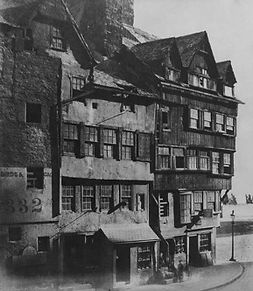
Easy-to-Learn
"Talk sometimes in a foreign language, not to forget how bad you know it."
- Boleslav Paszkowski
Languages
SCOTTISH
GAELIC
1599 - 1670
Major Thomas Weir was a Scottish soldier and presumed occultist, executed for witchcraft.
During one of Weir’s many prayer meetings he suddenly began to confess of the most unspeakable crimes. He announced his incestuous relationship with his sister Jean along with shocking tales of fornication with all manner of women and beasts.
Thomas Major was arrested. The trial began on April 9, 1670 and Jean told how the talent for witchcraft has been inherited from their mother, and revealed that Thomas bore the mark of the Beast on his body.
Weir was convicted of witchcraft and was taken to a spot on the cities boundary with Leith where he was strangled and burnt.
Major Thomas Weir was the last man executed for witchcraft in Scotland. As his body burned his staff was thrown into the fire. Witnesses said that it took an unusually long time to burn and made strange turning movements as it burned.
Weir's house earned a notorious reputation and remained uninhabited for a long time. Some claimed to have seen fiery flames lighting the rooms, accompanied by hysteric laughter. On other occasions, Major Weir was seen coming out of the house and getting into a black coach drawn by sinister horses. While nothing remains of the warlock’s house, his ghost might still be seen striding along the dark alleys and closes of Edinburgh’s Old Town.

Major Thomas Weir's house
West Bow, Edinburgh, 1855
English
Gaelic:
Transcription:
Sibh (you) is used for:
- plural "you";
- as a formal version of "you"
Dialogue 1
Word Order
The usual word order in Gaelic is:
Verb + Subject + Object/Adjective
Ex.: Tha mi pàiteach /I am thirsty/
[ha mi paːhdʲəx]

Gaelic: - Halò! Is mise Thomas Weir.
[ha'loː] [is miʃə]
English: - Hello! My name is Thomas Weir.
The man you see is Major Thomas Weir whose ghost
has been roaming the streets of Edinburgh searching for its master
since 1670 when Major Weir was strangled and burnt for witchcraft.
He has noticed you...
Choose one the following greetings for he knew
what time of day you usually go online (simple curiosity...)
Good morning
Madainn mhath
[madɪnʲ va]
Good afternoon / evening
Feasgar math
[fesgər ma]
Good night
Oidhche mhath
[eʲhe va]
Major Weir: - Halò! Is mise Thomas Weir.
You: - ........! Is mise ........................
Major Weir: - Ciamar a tha sibh?
You: - Pardon?..
Now, let's talk to him.
Relax, he can't see you,
I guess...
Emmm... Just a sec. I'll check it out... Ok, here:
How are you? (formal)
Ciamar a tha sibh?
[kʲimar a ha ʃiv]
English
Gaelic:
Transcription:
How are you? (informal)
Ciamar a tha thu?
[kʲimar a ha u]
Thu (you) is used for:
- a single person;
- younger or as old as yourself
Is the guy still there?
I guess he is. I can feel his hot breath on my neck. Pervert...
Wait a minute, it wasn't him. Who was it then?..
Anyway, let's answer Major Weir's question.
Choose one of the following variants:
English
Gaelic:
Transcription:
I am well, thank you
Tha mi gu math, tapadh leibh
[ha mi gə ma tahbəɣ leːv]
I am sick
Tha mi tinn
[ha mi tʲĩːNʲ]
I am tired
Tha mi sgìth
[ha mi sgʲiː]
I am afraid
Tha mi eagalach
[ha mi egəLəx]
Ready? Let's continue
the conversation.
Don't forget to ask him how he is, adding fhèin [heːn](self)
after sibh.
Major Weir: - Ciamar a tha sibh?
You: - ................ .............................. fhèin?
Major Weir: - Tha sibh ràsanach. Mar sin leibh.
You: - What the--?
Ok, that was rude. Not you. Your response was totally appropriate.
He called you boring - ràsanach" [raːsənəx]
and said "goodbye" - mar sin leibh [mar ʃi:n le:v].
Choose one of the following answers to bring this creepy conversation to an and.
Goodbye for now
Mar sin leibh an-dràsta
[mar ʃe:n le:v ənˈdraːsdə]
Goodbye
Beannachd leibh
[bjaNəxg le:v]
See you
Bidh mi 'gad fhaicinn
[bi mi gad fɛçgʲɪNʲ]
English
Gaelic:
Transcription:
Dialogue 2
English
Gaelic:
Transcription:
UNIT 1: Greetings